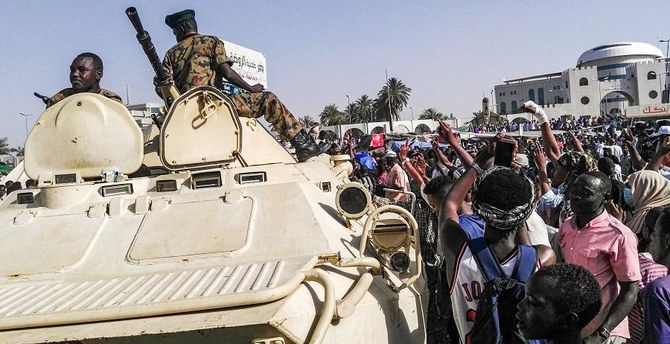KHARTOUM: Sudan’s new military rulers arrested ousted President Omar Al-Bashir’s two brothers for corruption, part of a broad sweep against officials and supporters of the former government, the country’s official news agency reported Thursday.
The spokesman of the military council, Gen. Shams Eddin Kabashi, was quoted by SUNA as saying that Abdullah and Abbas Al-Bashir were taken into custody, without providing more details or saying when it happened.
The Sudanese military ousted Omar Al-Bashir last week, after four months of street protests against his 30-year rule marred by conflict, civil war and corruption. Al-Bashir is also wanted for genocide and crimes against humanity by the International Criminal Court for atrocities committee in the western region of Darfur.
The brothers’ detention was likely another concession by the military to the protesters, who have demanded that all key figures and ranking officials from the former president’s circle be arrested. A number of Al-Bashir’s close associates and former government officials have already been taken into custody since the military overthrew Al-Bashir last Thursday.
The military council, which is now running the country, said the former president was transferred on Tuesday to Koper Prison in the capital, Khartoum, a facility notorious for holding political prisoners under Al-Bashir.
Huge crowds joined a protest outside Sudan's defence ministry on Thursday to demand that the country's transitional military council hand power to civilians, a Reuters witness said.
The crowds were the largest since former President Omar Al-Bashir was ousted a week ago and the military council took over, with hundreds of thousands packing the streets in the centre of the capital by early evening.
Protesters chanted "Freedom and revolution are the choice of the people" and "Civilian rule, civilian rule", and waved national flags overhead.
Activists who have been holding a sit-in outside the defence ministry compound in Khartoum since before Bashir's ouster had called for a mass protest on Thursday to increase pressure on the council.
It comes after an opposition coalition called this week on the military to establish a civilian-led ruling council with military representation, as well as a civilian government.
The council has said it is ready to meet some of the protesters demands, including fighting corruption, but has indicated that it would not hand over power to them.
The Khartoum sit-in was the culmination of 16 weeks of protests triggered by a worsening economic crisis in Sudan, leading to the ouster and arrest of Bashir after three decades in power.
The United States supports a democratic and peaceful transition in Sudan led by civilians who represent all Sudanese, the State Department said on Thursday, as protesters in Khartoum kept up demands that the country's military hand over power to civilians.
State Department spokeswoman Morgan Ortagus said Sudan remained labeled by the US as a state sponsor of terrorism, and emphasized that Washington's policies toward Sudan would be based on "our assessment of events on the ground and the actions of transitional authorities."
She said the US was "encouraged" by the release of political prisoners and the cancellation by the transitional military council of a curfew.
Meanwhile, South Sudan’s President Salva Kiir offered to mediate in Sudan’s political crisis. In a letter seen by The Associated Press, Kiir this week pledged his support for a transition where the rights of the Sudanese people are protected and offered to “mediate the on-going negotiations” among various groups.
Some in South Sudan are concerned that Al-Bashir’s departure will hurt their country’s fragile peace deal, which Al-Bashir helped broker. South Sudan declared independence from Sudan in 2011, following decades of civil war.
But they new country subsequently sank into its own civil war, which ended with an agreement signed in September. The deal calls for opposition leader Riek Machar to return to South Sudan next month to once again become Kiir’s deputy, though that looks increasingly unlikely as tensions continue.
One political analyst called Kiir’s offer of mediation over Al-Bashir a “hypocritical public relations” stunt.
“It doesn’t make sense. You cannot leave your house in a mess and claim to clean your neighbor’s house,” Jacob Chol, professor at the University of Juba, told the AP.
















